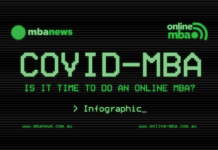
One of the largest educators in Australia, the University of Western Sydney prides itself on having a deep commitment to research and its ties to the local communities. With a modern and progressive outlook, they aim to “bring knowledge to life” by combining academic learning and practical experience.
The UWS’s Sydney Graduate School of Management redesigned the MBA in 2013 to encompass a much broader scope of disciplines and to better reflect the realities of modern business. To help design the program, UWS recruited a panel of experienced business people currently working in Western Sydney. The panel is involved in ongoing consultation to provide the employers’ perspective on real world trends and challenges affecting business.
Emphasis is placed on functional and applied skills, complemented by cultural studies designed to enable managers to act sensitively, appropriately and effectively in the international business environment. With a mix of theory and practice throughout the program, the MBA is relevant and immediately applicable to your workplace.
“I aim for my students to achieve deep learning, where they can take information from the classroom and apply it to their own business situation the next day at work.” Sydney Graduate School of Management Professor of Marketing Professor Suzan Burton.
The Sydney Graduate School of Management (SGSM) is located in the centre of Parramatta, a city fast becoming an economic force to be reckoned with, as more businesses – from large multinationals to small and medium enterprises – choose to locate their operations here.
University of Western Sydney MBA Program Structure
The program is delivered through the new Parramatta campus on a two year full-time basis for domestic and international students, or four years part-time for domestics only. It has been split into four quarters – starting in January, April, June and September.
There are 16 subjects – each worth 10 credit points each – meaning students need to complete 160 points to graduate. Four of the subjects are core, four are foundational, two are capstone and six are electives – which can be used to complete a specialisation.
MBA
The core subjects:
- Financial Reports for Decision Making
- Contemporary People Management
- Integrated Business Experience 2
- Economics
Foundational units:
- The Contemporary Business Environment
- Business Communication Skills
- Understanding Contemporary Organisations
- Integrated Business Experience 1
Specialisations:
- Management
- Marketing
- Logistics and Supply Chain Management
- Hospitality and Tourism
- Sustainable Business
- Innovation and Entrepreneurship
- Human Resource Management
- Finance and Investment
- Property
- Information and Communications Technology
The capstone subjects involves a choice of either a Business Project or an Internship.
Executive MBA
Foundation units:
- The Business Environment
- Financial Decision Making
- Foundations of Management
- Marketing Management
Developing Expertise
- Managerial Finance
- Contemporary Organisational Behaviour
- Emerging Leaders
- Developing Business Expertise
- Customer Value Management
- Innovation, Creativity and Entrepreneurship
- Managerial Economics
- Strategic Management
Expert Practice
- Corporate Governance and the Global Environment
- Negotiation and Conflict Resolution Management
- One Hundred Days
- Applied Business Project
University of Western Sydney MBA Entry Requirements
Applicants must have successfully completed an undergraduate degree, or higher, in any discipline.
Applicants who have undertaken studies overseas may have to provide proof of proficiency in English.
International applicants must apply directly to the University of Western Sydney via UWS International.
Overseas qualifications must be deemed by the Australian Education International – National Office of Overseas Skills Recognition (AEI-NOOSR) to be equivalent to Australian qualifications in order to be considered by UAC and UWS.
University of Western Sydney MBA Fees*
Domestic fees: $46,160 (indicative fee of $2,750 per subject. 16 subjects)
*Information from fees is sourced from publicly available information in November 2016 and may not be reflective of actual costs. Current costs per subject/unit/course may change in the future, altering the overall cost of the degree. Consult course providers for fee confirmation.









